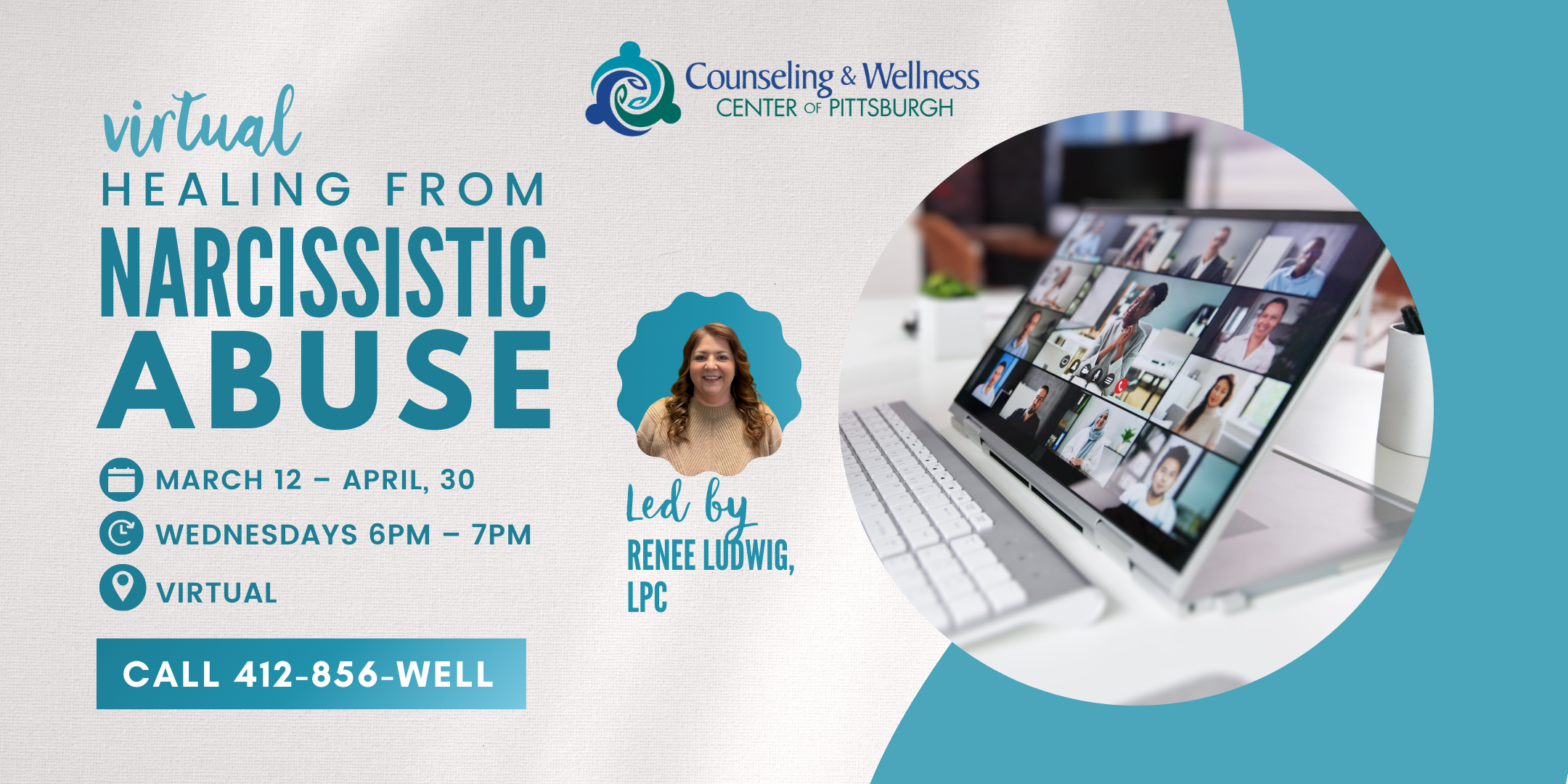
Healing From Narcissistic Abuse Virtual Group Therapy
Have you ever found yourself questioning your reality, doubting your worth, or feeling trapped in a relationship that chips away at your confidence and joy? Narcissistic abuse can leave deep emotional wounds, often making it hard to trust yourself or even recognize the signs of manipulation.
Healing From Narcissistic Abuse Virtual Group Therapy
March 12, 2025 – April 30, 2025
Wednesdays | 6:00 PM – 7:00 PM
In today’s world, the term “narcissist” is often tossed around casually on social media, not only creating confusion about what narcissistic abuse truly involves but also minimizing the validity of your experience. Overuse of the label can blur the lines between someone with Narcissistic Personality Disorder and individuals who might display problematic behavior, like cheating, being rude or self-centered, but lack the manipulative patterns of abuse seen in narcissistic relationships.
This, combined with the gaslighting you’ve endured, can make it even harder to trust your own perceptions. You may find yourself questioning whether you’re dealing with narcissistic abuse or simply a toxic relationship, leaving you feeling isolated, frustrated, and unsure of how to move forward. That’s where our Narcissistic Abuse Support Group comes in—a space to validate your journey, connect with others, and begin reclaiming your sense of self.
In this safe and supportive space, you’ll be able to share your story and hear from others who have experienced relationships with narcissistic partners. By connecting with others, members will gain a deeper understanding of their own experiences, identify patterns of manipulation and control, and find fellowship with those on similar healing journeys.
Whether you’re healing from the aftermath of a relationship with a narcissist or trying to determine if you’re in one now, this group will provide tools, validation, and guidance to help you regain your confidence, trust your instincts, and take meaningful steps toward healing. You deserve clarity, empowerment, and the freedom to reclaim your life.

Why Join the Narcissistic Abuse Support Group?
- Reconnect with Yourself: Rebuild your confidence and learn to trust your intuition again.
- Understand the Impact: Learn how narcissistic abuse affects your emotions, self-esteem, and decision-making.
- Share and Heal: Hear from others who have been in similar relationships and know you’re not alone.
- Gain Tools for Change: Discover strategies to set boundaries, recognize manipulation, and take steps toward healing.
Who Should Join the Healing from Narcissistic Abuse Group Therapy?
This group is for anyone who:
- Has been in a relationship with someone they suspect or know is a narcissist.
- Feels confused, overwhelmed, or unsure about their experiences.
- Wants to share their story in a safe, validating space.
- Is ready to learn tools to move forward and heal.
Group Therapy: Healing From Narcissistic Abuse Outline
Week 1: What is Narcissistic Personality Disorder?
Understand the psychological traits of narcissists and how they affect relationships.
Week 2: Traits of a Narcissist
Learn to identify key behaviors, such as gaslighting, manipulation, and control.
Week 3: The Quiz – Am I in a Relationship with a Narcissist?
Gain clarity about your relationship dynamics and recognize the signs of narcissistic abuse.
Week 4: Creating Boundaries with a Narcissist
Discover practical ways to protect yourself emotionally and mentally.
Week 5: What to Do if You’re in a Relationship with a Narcissist
Explore steps for navigating, exiting, or responding to an unhealthy relationship.
Week 6: Gaslighting and Love Bombing
Break down the most common tactics used by narcissists and how to resist their effects.
Week 7: Why Is It So Hard to Leave a Narcissistic Relationship?
Understand trauma bonding and the deep emotional barriers to breaking free.
Week 8: Healing from Narcissistic Abuse
Focus on recovery, self-compassion, and rebuilding a life rooted in strength and self-worth.

Meet Your Facilitator for Virtual Healing from Narcissistic Abuse Group
Group Therapy: Healing From Narcissistic Abuse FAQs
Q: Where will the Narcissistic Abuse Support Group be held?
A. The Narcissistic Abuse Support Group will be held virtually. You will receive a video link after joining.
Q: What Day and Time is the Narcissistic Abuse Support Group?
A. The Narcissistic Abuse Support Group will occur virtually on Wednesdays from 6:00 PM – 7:00PM.
Q: What dates does the Virtual Healing from Narcissistic Abuse Group Therapy run?
A. The Virtual Healing from Narcissistic Abuse Group Therapy will begin on Wednesday March 12, 2025 and conclude on Wednesday April 30, 2025.
Q: How many weeks does the Virtual Healing from Narcissistic Abuse Group Therapy run?
A. The Virtual Healing from Narcissistic Abuse Group Therapy runs for 8 weeks.
Q: Who is facilitating the Virtual Healing from Narcissistic Abuse Group Therapy?
A. The Virtual Healing from Narcissistic Abuse Group Therapy is led by Renee Ludwig, LPC. Renee brings extensive experience as a group therapy leader and is passionate about creating spaces where you feel seen and understood.
With a background in addictions counseling and family therapy, Renee has a deep understanding of relational dynamics and the importance of healing in community. She believes that sharing your story is a powerful step toward recovery and that connecting with others who have similar experiences can be transformative.
Q: Do you accept insurance for the Healing from Narcissistic Abuse Group Therapy?
A. Yes, we accept Highmark BCBS, UPMC, United/Optum, Aetna, Cigna, and Medicare.
Q: What is the self-pay fee for the Narcissistic Abuse Support Group?
A. The self-pay fee is $50 per class.
Q: Can anyone join the Virtual Narcissistic Abuse Support Group?
A. The Virtual Narcissistic Abuse Support Group is open to all adults. However, please note that an intake is required prior to joining.
Q: Do I have to be a current Counseling and Wellness Center of Pittsburgh client to join?
A. No, you do not need to be a client with us. However, to ensure the group is a good fit for you, an intake with Renee Ludwig, LPC will be required. This will help us tailor the experience to best meet your needs.
Q: Do I have to attend all sessions or can I drop in?
A. You do not need to attend all sessions and can drop in after the group starts. PLEASE NOTE: You must get registered and have an intake with Renee Ludwig, LPC.
If you are interested in attending after the group begins call 412-322-2129 ext. 3.
Q: How do I sign up for the Virtual Healing from Narcissistic Abuse group?
A. Please email info@counselingwellnesspgh.com or call 412-322-2129 ext. 3 if you are interested in joining the Virtual Healing from Narcissistic Abuse group. You can also fill out the form at the bottom of this page.
Ready to Join the Virtual Narcissistic Abuse Support Group?
Please fill out the form below if you have any questions about our Virtual Healing from Narcissistic Abuse Group or are ready to get started! Our team is here to provide you with the information and support you need.
Blog Posts About Narcissistic Personality Disorder

Therapy Speak: When Language Gets Misused and Weaponized
by Counseling and Wellness Center of PittsburghMarch 5, 2025 boundaries, gas lighting, gaslighting, manipulation, narcissist, narcissistic personality disorder, psychological jargon, therapy speak, trauma dumping, ultimatums, weaponizing therapy speak0 comments
Therapy Speak: When Language Gets Misused and Weaponized
In recent years, therapy speak—the casual and often incorrect use of psychological jargon—has made its way into everyday conversations. Social media, podcasts, and influencers have played a significant role in popularizing terms like “narcissist,” “gaslighting,” “boundaries,” and “trauma dumping.”
While...
Learn More
No Contact vs. The Silent Treatment
by Counseling and Wellness Center of PittsburghDecember 4, 2024 abuse, adult children of emotionally immature parents, emotional abuse, emotionally immature parents, family estrangement, how to deal with a narcissist, narcissist, Narcissistic mother, Narcissistic parents, narcissistic personality disorder, no contact, no contact rule, silent treatment, toxic family, toxic parents, toxic relationships, trauma bond, Unhealthy relationships0 comments
No Contact vs. The Silent Treatment
In relationships, communication is key. Two common strategies used to withdraw emotionally are the No Contact rule and the Silent Treatment. While they may appear similar, these two approaches differ significantly in their intent, duration, and emotional impact. Understanding the distinction between these strategies is essential...
Learn More
What is a Trauma Bond and How to Break Free
by Counseling and Wellness Center of PittsburghSeptember 26, 2024 abuse, abusive relationship, domestic violence, emotionally immature parents, gas lighting, gaslighting, love bombing, manipulation, narcissist, Narcissistic mother, Narcissistic parents, narcissistic personality disorder, Personality disorders, red flags, relationship red flags, signs of a toxic relationship, stockholm syndrome, toxic relationships, trauma, trauma bond, Unhealthy relationships, victims0 comments
What is a Trauma Bond and How to Break Free
A trauma bond is a complex psychological and emotional attachment that forms in an abusive or toxic relationship. These bonds differ from healthy attachments, as they are built through cycles of intense emotional experiences, often involving pain, manipulation, and abuse. Trauma bonds can be difficult to recognize and...
Learn More
Emotional Invalidation, cPTSD, and Its Lasting Impact
by Counseling and Wellness Center of PittsburghAugust 21, 2024 ACEs, adult children of emotionally immature parents, Adverse Childhood Experiences, childhood trauma, complex post traumatic stress disorder, complex trauma, cptsd, effects of emotional invalidation, emotional invalidation, emotional invalidation examples, invalidating, validation0 comments
Emotional Invalidation, cPTSD, and Its Lasting Impact
Emotional validation is crucial for healthy human development, especially within the parent-child relationship. When parents fail to validate their children’s emotions, dismissing or minimizing their feelings, it can lead to profound and long-lasting consequences.
In this blog post, we’ll explore...
Learn More
Adult Children of Emotionally Immature Parents
by Counseling and Wellness Center of PittsburghDecember 7, 2023 abuse, adult children of emotionally immature parents, borderline personality disorder, boundaries, BPD, BPD Relationships, complex trauma, counseling for trauma, cptsd, dysfunctional family, emotionally immature parents, family counseling, family estrangement, generational trauma, invalidation, Narcissistic mother, Narcissistic parents, narcissistic personality disorder, Personality disorders, pittsburgh, resilience to trauma, therapy for trauma, toxic family, toxic parents, trauma, trauma counseling, trauma informed care, trauma therapy, traumatic childhood, victim blaming1 comment
Adult Children of Emotionally Immature Parents
Being a parent is a big responsibility. And sometimes, parents find it difficult to work through their emotions. A parent’s inability to be emotionally mature, often referred to as emotionally immature parents, can make things complicated for their kids and the entire family as a whole.
The...
Learn More
Adverse Childhood Experiences ACEs: Understanding the Impact of Childhood Trauma and Building Resilience
by Counseling and Wellness Center of PittsburghJune 5, 2023 ACEs, Adverse Childhood Experiences, child counseling, children mental health0 comments
Childhood is a time of innocence, wonder, and growth. However, for some individuals, this period may be marred by adverse childhood experiences (ACEs) that can have a lasting impact on their lives. In this blog post, we will explore the world of ACEs, delve into their effects, discuss the importance of addressing and mitigating the consequences of childhood trauma, and explore...
Learn More
Are These Relationship Expectations Holding You Back?
by Counseling and Wellness Center of PittsburghFebruary 1, 2023 borderline personality disorder, expectations, fairytale romance, healthy relationships, jealousy, narcissistic personality disorder, sexual chemistry, soulmates0 comments
I remember watching Cinderella as a young girl and dreaming about the day that I would find my own true love. After all, who wouldn’t want a prince to save them from the mundane tasks of everyday life? But it turns out that those Disney movies, and the relationship expectations they created for future relationships, held me back from establishing healthy relationships early on. I...
Learn More
People with Personality Disorders Do This In Relationships
by Counseling and Wellness Center of PittsburghSeptember 8, 2020 borderline personality disorder, Bowen Systems theory, healthy relationships, narcissistic personality disorder, Personality disorders, Unhealthy relationships0 comments
People with Personality Disorders Do This In Relationships
Differentiation of Self: Learning to balance Self Needs with the Needs of Others
We can all agree that balance is a key component to healthy living. Sometimes it comes naturally, but more often than not, balance is really hard to maintain. One of the most difficult places to find balance is in our relationships. If we want to...
Learn More
14 ways to tell if a relationship is toxic.
by Counseling and Wellness Center of PittsburghMarch 28, 2019 abuse, anger, borderline personality disorder, BPD, BPD Relationships, domestic violence, jealousy, narcissistic personality disorder, Personality disorders, relationship conflict, signs of a toxic relationship, toxic relationship signs, Unhealthy relationships0 comments
14 Toxic Relationship Signs
According the great writer Leo Tolstoy “All happy families are alike; each unhappy family is unhappy in its own way.” Our sources say, ‘Not true Tolstoy’, of course when psychologists and social scientists put their noses in the matter we can quantify and define the exact toxic relationship signs to look out for.
A healthy marriage, friendship, or...
Learn More

